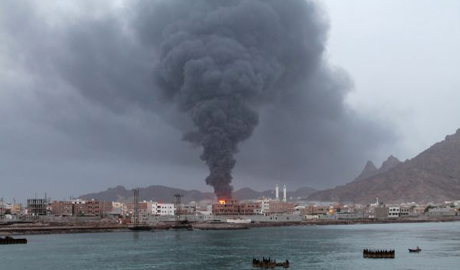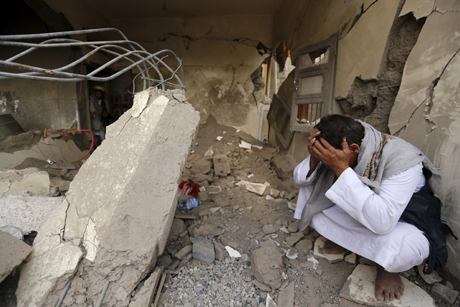
Fire and smoke rising from the Aden oil refinery following a reported shelling attack by Shia Houthi rebels in the embattled southern Yemeni city of Aden on July 13, 2015. Now with the Saudi-led coalition military operation in Yemen entering its second year on March 26, 2016, the country's humanitarian crisis is worsening. (Photo: AFP)
Reaching a peace deal in conflict-stricken Yemen is crucial in order to avert a "catastrophic humanitarian crisis," said Joost Hiltermann, MENA programme director of the International Crisis Group.
In a Wednesday lecture at the American University in Cairo, Hiltermann said he believes that the 8 March talks between the Houthis and Saudi Arabia were a breakthrough in the peace process and a positive step towards de-escalation between the two sides.
On Wednesday, Ismail Ould Cheikh, the United Nations envoy to Yemen, announced a cease-fire on 10 April ahead of a new round of peace talks starting 18 April in Kuwait.
Hiltermann said that negotiations should lead to an interim settlement that must include security arrangements which pave the way for a militia withdrawal from cities.
According to the United Nations, more than 6,000 people have been killed since the start of the Saudi-led military intervention in Yemen last year.
Speaking on the challenges confronting the warring parties in successfully forging a deal in the talks, Hiltermann said that Saudi Arabia views the Houthis as part of an expanding Iranian threat in the region.
In a report published by the International Crisis Group on Yemen, the Houthi/Saleh bloc is also considerably complicating peace prospects by increasing cross-border attacks into the Saudi kingdom, “a move that makes it more difficult for the kingdom to halt the conflict when it cannot boast a clear military victory.”
“Following the Iranian nuclear deal [with the US and its allies], there was a Saudi panic over Iran’s role in the international community,” Hiltermann said, referring to the lifting of international sanctions on Iran in exchange for limiting its nuclear programme.
“For Saudi Arabia, the Houthis crossed the line when [they took over the Yemeni capital] Sanaa in September 2014, especially after [Yemen's] President Abd Rabbu Mansor Hadi was placed under house arrest.”
Following the Houthi takeover a year ago, a Saudi-led coalition began a military campaign in Yemen with the aim of preventing the Iran-allied Houthi Shia rebels and forces loyal to Yemen's ex-president Ali Abdullah Saleh from taking control of the country.
The Saudi Kingdom rallied a coalition of nine mostly Sunni Arab states.
The United States, the United Kingdom, and France have lent support to the Saudi military operation, the International Crisis Group report said.

A man who lost his relatives in a Saudi-led air strike cries at the site of the air strike in Yemen's capital Sanaa, September 21, 2015 (Reuters)
Who has a stronger grip on Yemen?
With each side fighting over control of Yemen, both have shown strength in different areas, making it difficult to speculate on who would likely come out on top.
Whatever the results are, however, Yemen’s immediate future looks bleak.
The Houthi militias' strength in Yemen, according to Hiltermann, has been reflected in its military capabilities, as they had prior fighting experience in clashes with Saleh’s forces in 2004.
The Houthi militias have also been receiving weapons from their Shia ally Iran, though it is considered of little help.
The Houthis also showed strength in their ability to forge an alliance with ex-president Saleh.
In 2011, Saleh was given immunity from criminal prosecution for himself and his family in exchange for stepping down.
In a bid to recover part of his 32-year grip on power, the ousted Saleh started aiding the Houthis.
“However, the Saudi kingdom is playing on the differences between Saleh and the Houthis,” Hiltermann says.
Saudi Arabia, on the other hand, showed that it has an edge when it comes to bombings and airstrikes, as they have "outstanding" pilots.
The support from the United States in refuelling planes in mid-air and offering weaponry and military advice was of great assistance to the Saudis.
However, Saudi Arabia has no ground forces in Yemen, and it "cannot win with weak ground forces," according to Hiltermann.
“The Saudi kingdom needs to declare a victory soon, and they will need to announce their success in Yemen,” he said.
“The only losers here are the Yemeni population, with many Yemeni areas on the verge of starvation.”
Short link: